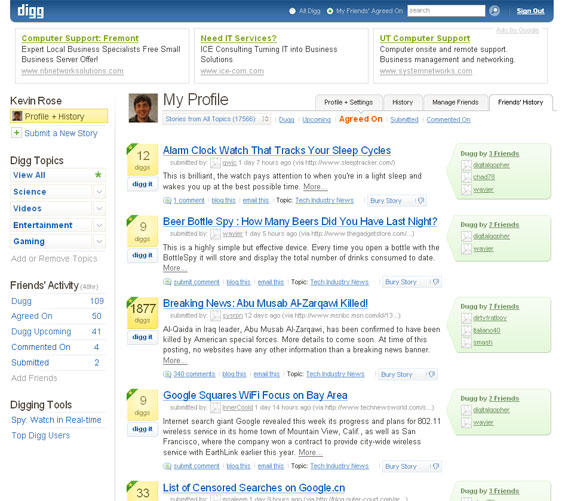Digg is a technology news web page that combines blogging, non-hierarchical editorial control, social bookmarking and RSS. Users submit news items or web links that they find interesting, and these are then promoted to the headlines through a cyber-plebiscite of sorts in which the readers- and not some editor- decide what content gets highlighted.
All of Digg's content is freely accessible, but in order to modify that content- by voting (digging) for the most popular submitted items and/or add comments to them- one has to register as a user. Currently there are some 250,000 registered users. News and web resources featured in Digg span from music and games to cyber-censorship in China and the future of the internet, as well as the latest news from Google, My Space, Microsoft, Netscape, Yahoo and much more.
When it was born in 2004, Digg featured no advertising, but given its explosive popularity, its founders have now endowed it with ads through Google AdSense. It's called Digg and not Dig because the dig.com domain belonged to the Walt Disney corporation.
Digg is going to unveil a bodacious upgrade next Monday. Here's some info about it, taken from the excellent Tech Crunch blog:
Digg 3.0 To Launch Monday: Exclusive Screenshots and Stats, by Michael Arrington
100 comments »
 Digg 3.0 will launch Monday, June 26, in the morning PST. The launch is being announced this evening, and Digg has made a number of screen shots available to me which are included in this post.
Digg 3.0 will launch Monday, June 26, in the morning PST. The launch is being announced this evening, and Digg has made a number of screen shots available to me which are included in this post.
Richard MacManus and I interviewed Digg founders Jay Adelson and Kevin Rose about the new launch, and we also spent some time talking about new Digg competitor Netscape, as well as other Digg related issues. Listen to the podcast on TalkCrunch.
In addition to a redesign (that retains the essential Digg “experience”), Digg is adding a number of news categories beyond technology. Topics are grouped into six “containers”, including technology, entertainment, gaming, science, world & business, and online video. The default view on Digg is still the technology container, although users can change that view and can also deselect individual topics within containers to further refine what they see on the home page.
There are other significant feature additions as well (we go through all of them in the podcast). In addition to seeing what your friends have dugg, users can also just see stories more than one friend has dugg, further filtering new stories to what they might really want to see. Also, changing views between top stories and new stories won’t require a page refresh - Digg has added Ajax features (sparingly, they stress) to switch quickly between headlines and new stories, and among topics/containers.
 Digg is looking more and more like the newspaper of the web, and is challenging even the New York Times on page views (Digg surpassed rival Slashdot long ago).
Digg is looking more and more like the newspaper of the web, and is challenging even the New York Times on page views (Digg surpassed rival Slashdot long ago).
About 800,000 unique visitors come to Digg every day, generating 9 million plus page views. The site is doubling in traffic every two months. And the amazing thing is that Digg does all of this with just 15 employees.
Digg has raised $2.8 million in venture funding from Greylock and Omidyar as well as angel investors Marc Andreesen, Reid Hoffman and Ron Conway. Given the tremendous growth and passionate users, something tells me they are going to have a rather large liquidity event.
Screen Shots:



0 Comentarios:
Publicar un comentario
Suscribirse a Comentarios de la entrada [Atom]
<< Página Principal